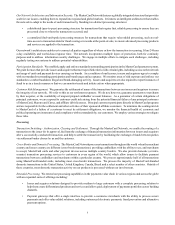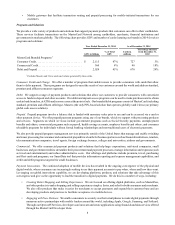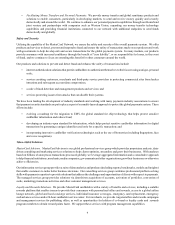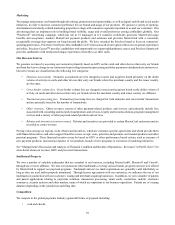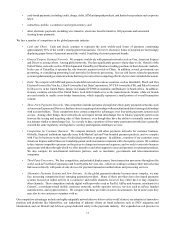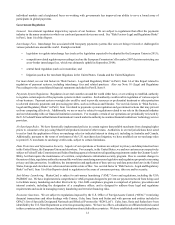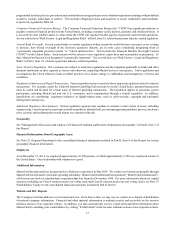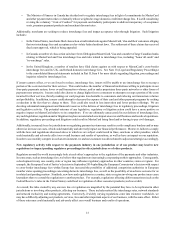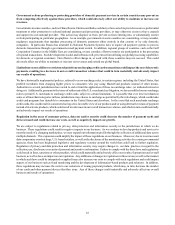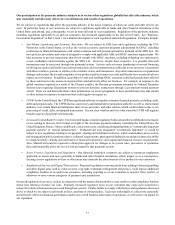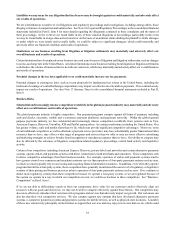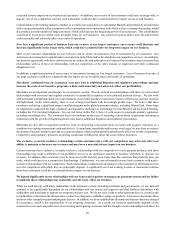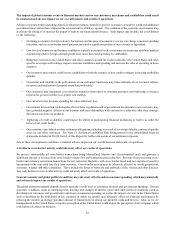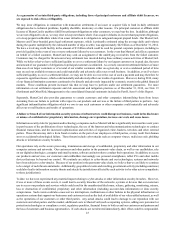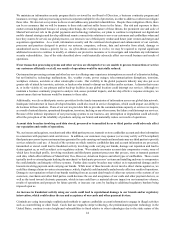MasterCard 2014 Annual Report Download - page 19
Download and view the complete annual report
Please find page 19 of the 2014 MasterCard annual report below. You can navigate through the pages in the report by either clicking on the pages listed below, or by using the keyword search tool below to find specific information within the annual report.17
Our participation in the payments industry subjects us to various other regulations globally that affect the industry, which
may materially and adversely affect our overall business and results of operations.
We are subject to regulations that affect the payments industry in the many countries in which our cards and other devices are
used. In particular, many of our customers are subject to regulations applicable to banks and other financial institutions in the
United States and abroad, and, consequently, we are at times affected by such regulations. Regulation of the payments industry,
including regulations applicable to us and our customers, has increased significantly in the last several years. See “Business-
Government Regulation” in Part I, Item 1 for a detailed description of such regulation and related legislation. Examples include:
• Anti-Money Laundering and Economic Sanctions - We are subject to AML laws and regulations, including the USA
Patriot Act in the United States, as well as the various economic sanctions programs administered by OFAC, including
restrictions on financial transactions with certain countries and with persons and entities included on the SDN List. We
have policies, procedures and controls designed to comply with applicable AML and OFAC sanctions requirements. We
take measures to prevent transactions that do not comply with OFAC sanctions, including obligating our customers to
screen cardholders and merchants against the SDN List. However, despite these measures, it is possible that such
transactions may be processed through our payments system. Activity such as money laundering or terrorist financing
involving our cards could result in an enforcement action, and our reputation may suffer due to our customer’s association
with those countries, persons or entities or the existence of any such transaction. Any enforcement action or reputational
damage could reduce the use and acceptance of our products and/or increase our costs, and thereby have a material adverse
impact on our business. In addition, geopolitical events and resulting OFAC sanctions could lead jurisdictions affected
by those sanctions to take actions in response that could adversely affect our business. For example, in response to the
global sanctions imposed as a result of the Ukraine conflict, the Russian government amended its National Payments
Systems laws requiring all payment systems to process domestic transactions through a government-owned payment
switch. There is a risk that in the future other jurisdictions (or actors sympathetic to these jurisdictions) may take similar
or other actions in response to sanctions that could negatively impact us.
• CFPB - In the United States, the CFPB has significant authority to regulate consumer financial products, including credit,
debit and prepaid cards. The CFPB also has supervisory and independent examination authority as well as enforcement
authority over certain financial institutions, their service providers, and other entities, which could include us due to our
processing of credit, debit, and prepaid transactions. It is not clear whether and/or to what extent the CFPB will regulate
broader aspects of payment card networks.
• Increased Central Bank Oversight - Several central banks or similar regulatory bodies around the world that have increased,
or are seeking to increase, their formal oversight of the electronic payments industry (including the United States, the
United Kingdom, Russia , Mexico and Brazil), are in some cases considering designating them as “systemically important
payment systems” or “critical infrastructure.” If MasterCard were designated “systemically important”, it would be
subject to new regulations relating to its payment, clearing and settlement activities, which could address areas such as
risk management policies and procedures; collateral requirements; participant default policies and procedures; the ability
to complete timely clearing and settlement of financial transactions; and capital and financial resource requirements.
Also, MasterCard could be required to obtain prior approval for changes to its system rules, procedures or operations
that could materially affect the level of risk presented by that payments system.
• Issuer Practice Legislation and Regulation - Our financial institution customers are subject to numerous regulations
applicable to issuers and more generally to banks and other financial institutions, which impact us as a consequence.
Existing or new regulations in these or other areas may diminish the attractiveness of our products to our customers.
• Regulation of Internet and Digital Transactions - Proposed legislation in various jurisdictions relating to Internet gambling
and other digital areas such as cyber-security, copyright, trademark infringement and privacy could impose additional
compliance burdens on us and/or our customers, including requiring us or our customers to monitor, filter, restrict, or
otherwise oversee various categories of payment card transactions.
Increased regulatory focus on us, such as in connection with the matters discussed above, may result in costly compliance burdens
and/or may otherwise increase our costs. Similarly, increased regulatory focus on our customers may cause such customers to
reduce the volume of transactions processed through our systems. Finally, failure to comply with the laws and regulations discussed
above to which we are subject could result in fines, sanctions or other penalties. Each may individually or collectively materially
and adversely affect our financial performance and/or our overall business and results of operations, as well as have an impact on
our reputation.


